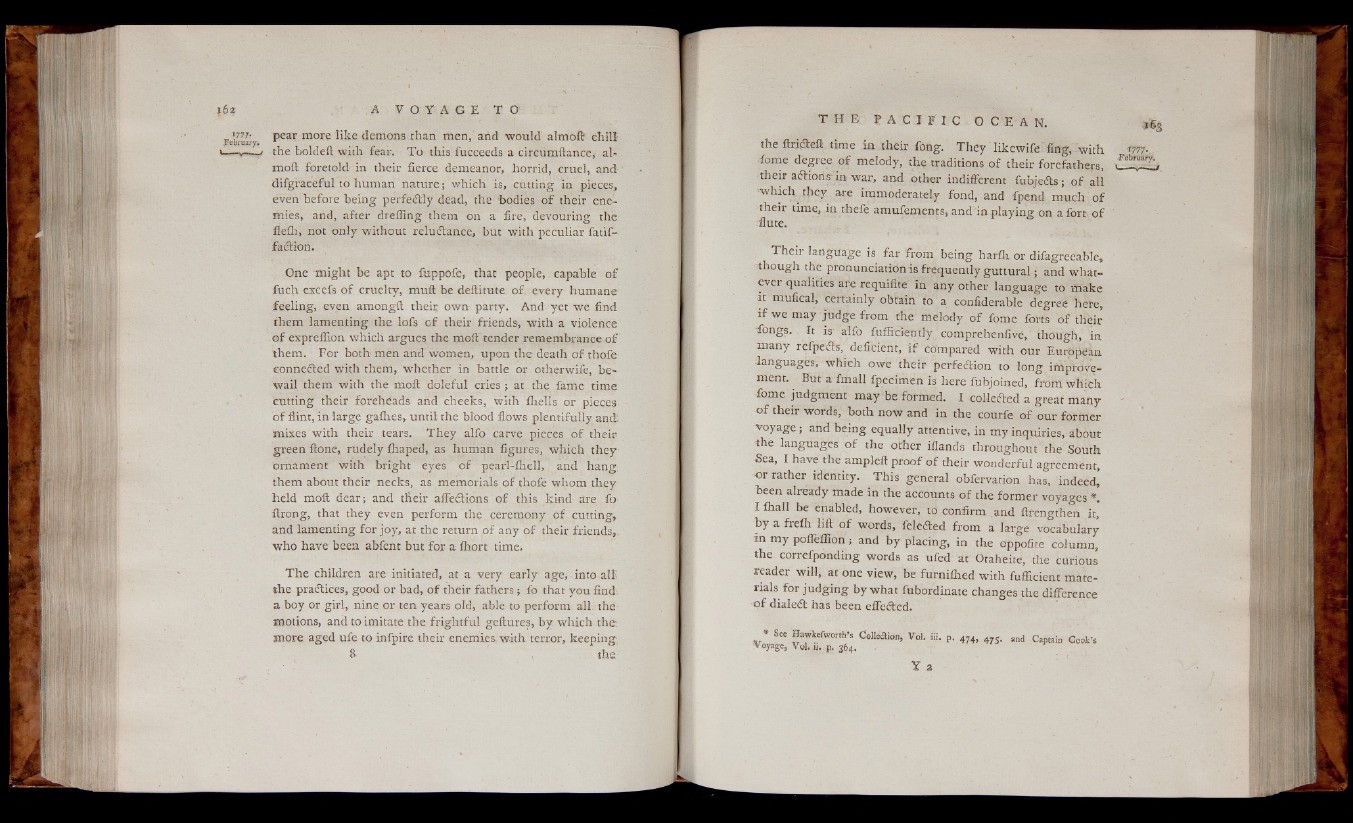
February* Pcar more lif e demons than men, and would almoft chill
*— v—mj the boldeft with fear. To this fueceeds a circumftance, al-
moft foretold in their fierce demeanor, horrid, cruel, and
difgraceful to human nature; which is, cutting in pieces*
even before being perfectly dead, the -bodies of their enemies,
and, after drefling them on a fire, devouring the
fleili, not only without reludtance, but with peculiar fatif-
faciion.
One might be apt to fuppofe, that people, capable of
fuch excefs of cruelty, muft be deilitute of. every humane
feeling, even amongft their own- party. And yet we find
them lamenting the lofs of their friends, with a violence
©f expreffion which argues the moil:'tender remembrance of
them. For both men and women, upon the death of thofe
connedled with them, whether in battle or otherwife, be*
wail them with the moil doleful cries ; at the fame time
cutting their foreheads and cheeks, with ihells or pieces
of flint, in large gafhes, until the blood flows plentifully and.
mixes with their tears. They alfo carve pieces o f their
green fione, rudely ihaped, as human figures, which they
ornament with bright eyes of pearl-ihell, and hang;
them about their necks, as memorials of thofe whom they
held moil dear; and their affedtions of this kind are To
ftrong, that they even perform the ceremony of cutting,
and lamenting for joy, at the return of any of their friends,,
who have been abfent but fop a ihort time.
The children are initiated, at a very early age, into alt
the practices, good or bad, of their fathers ; fo that you find:
a boy or girl, nine or ten years old, able to perform all the
motions, and to imitate the frightful geftures, by which the-
more aged ufe to infpire their enemies with terror, keeping:
8 the
theftricTeft time in their fong. They likewife fing, with
fome degree of melody, the traditions of their forefathers,
■their adlioris-in war, and other indifferent fubjedts; of all
-which they are immoderately fond, and fpend much of
their time, in thefe amufements, and in playing on a fort of
flute.
Their language is far from being harfh or difagreeable,
•though the pronunciation is frequently guttural; and whatever
qualities are requifite in any other language to make
it mufical, certainly obtain to a confiderable degree: here,
i f we may judge from the melody of fome forts of their
longs. It is- alfo fufficiently comprehenfive, though, in
many refpedls, deficient, i f compared with our European
languages, which owe their perfedtion to long improvement.
But a fmall fpeeimen is here fubjoined, from which
fome judgment may be formed. I colledled a great many
o f their words, both now and in the courfe of our former
voyage ; and being equally attentive, in my inquiries, about
the languages of the other iflands throughout the South
Sea, I have the amplefl proof of their wonderful agreement,
or rather identity. This general obfervation has, indeed,’
been already made in the accounts of the former voyages *.
Iihall be enabled, however, to confirm and ftrengthen it,
by a freih lift of words, feledled from a large vocabulary
m my pofleflion; and by placing, in the oppofite column,
the correfponding words as ufed at Otaheite, the curious
reader will, at one view, be furniihed with fufficient materials
for judging by what fubordinate changes the diffidence
o f dialedt has been effcdled.
* See HawkeiWorth’s Colleaion, Vol. ill. p. 474, m . and Captain Cook’s
Voyage, Vol. u. p, j64.
Y a